-
01-01-2015
Health technologies for spatial analysis and situational diagnosis of the territories: contributions to nursing
Revista Brasileira de Enfermagem. 2015;68(6):999-1000
Abstract
Health technologies for spatial analysis and situational diagnosis of the territories: contributions to nursing
Revista Brasileira de Enfermagem. 2015;68(6):999-1000
DOI 10.1590/0034-7167.2015680601i
Views0In order to establish an organizational basis for work processes in primary health care geared towards a new social practice, it is important to recognize territories and their contexts, as these materialize human interactions, conflicts, health problems and human needs. In the process of recognition and situational diagnosis of territories, technologies for spatial analysis can […]See more -
01-01-2015
Tecnologias em saúde para análise espacial e diagnóstico situacional dos territórios: contribuições para a enfermagem
Revista Brasileira de Enfermagem. 2015;68(6):999-1000
Abstract
Tecnologias em saúde para análise espacial e diagnóstico situacional dos territórios: contribuições para a enfermagem
Revista Brasileira de Enfermagem. 2015;68(6):999-1000
DOI 10.1590/0034-7167.2015680601i
Views0Para a constituição de uma base organizativa dos processos de trabalho na Atenção Primária à Saúde em direção a uma nova prática social é importante o reconhecimento dos territórios e seus contextos, pois estes materializam as interações humanas, os conflitos, os problemas de saúde e necessidades humanas.Nesse processo de reconhecimento e diagnóstico situacional dos territórios, […]See more -
01-01-2015
CARTA DE FORTALEZA PARA A ENFERMAGEM BRASILEIRA
Revista Brasileira de Enfermagem. 2015;68(5):961-962
Abstract
CARTA DE FORTALEZA PARA A ENFERMAGEM BRASILEIRA
Revista Brasileira de Enfermagem. 2015;68(5):961-962
DOI 10.1590/0034-7167.2015680527
Views0APRESENTAÇÃOOs participantes do 18º Seminário Nacional de Pesquisa em Enfermagem (SENPE), promovido pela Associação Brasileira de Enfermagem (ABEn) e realizado pela ABEn Seção Ceará, aprovaram, em Sessão Plenária de Encerramento, no dia 03 de junho de 2015, a “Carta de Fortaleza para a Enfermagem Brasileira”. A ABEn vem a público divulgá-la, ao mesmo tempo em […]See more -
01-01-2015
Delayed surgical recovery: a concept analysis
Revista Brasileira de Enfermagem. 2015;68(5):953-960
Abstract
Delayed surgical recovery: a concept analysis
Revista Brasileira de Enfermagem. 2015;68(5):953-960
DOI 10.1590/0034-7167.2015680526i
Views0See moreABSTRACT
Objective:
analyze the concept of delayed surgical recovery.
Method:
the Rodgers’ concept analysis provided the procedural mechanisms to guide the study, and an integrative review was performed to achieve the second activity of the model adopted. The PubMed, CINAHL, EMBASE and LILACS databases were selected to search for primary studies.
Results:
sixty-six primary studies were included and served as basis to construct the use and meaning of delayed surgical recovery concept. In the analysis, six attributes were outlined, which are interrelated and underpin the research concept definition. Preliminary experience was identified as the antecedent. The consequences of the concept are expressed through clinical manifestations, re-interventions, dependence on care and reduced quality of life.
Conclusion:
the definition of the concept was constructed, and the antecedents and consequents were identified. The use and meaning of the delayed surgical recovery concept point to the use of the qualifier ‘impaired’ instead of ‘delayed’.
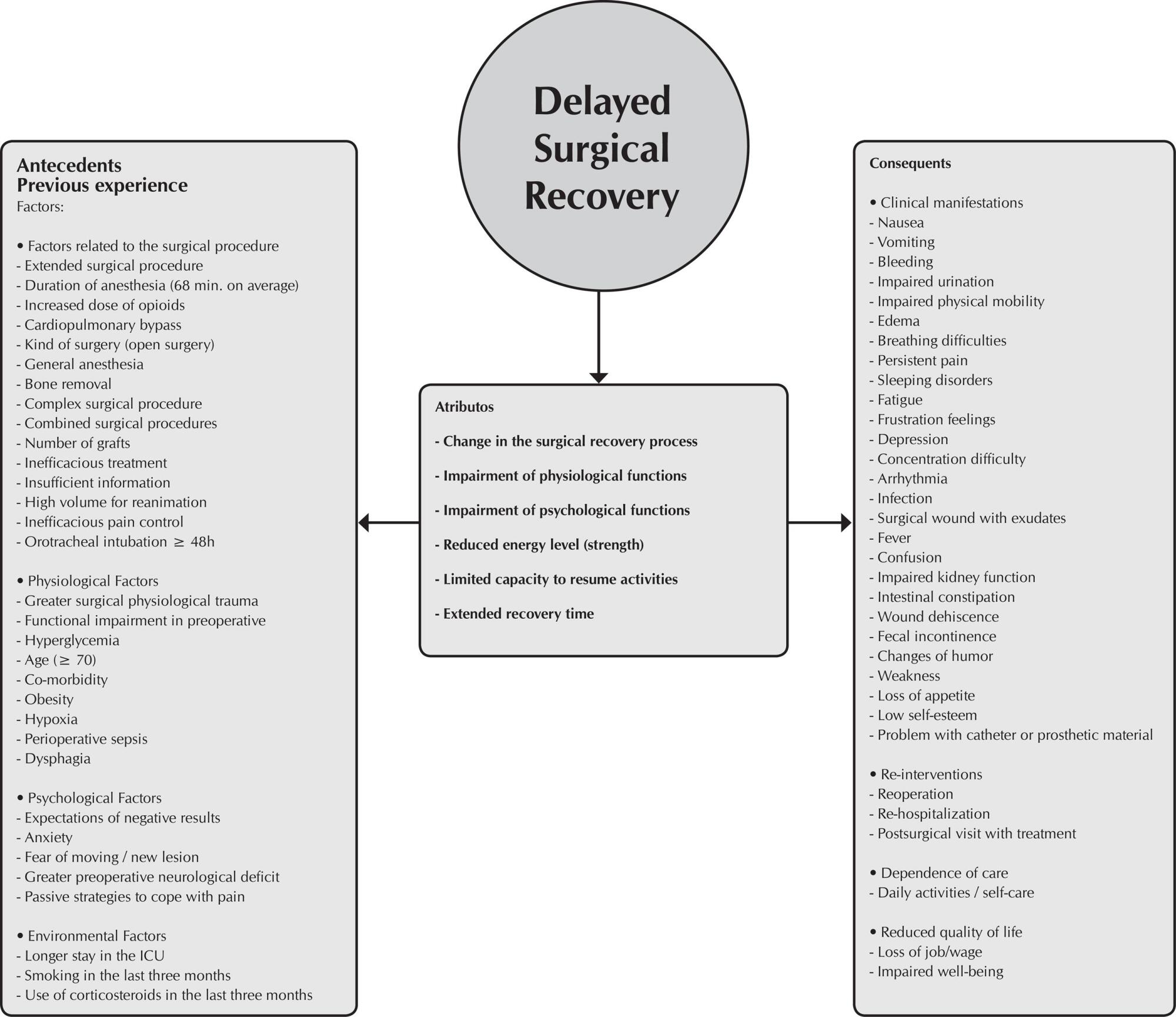
-
01-01-2015
Total Quality Management and hospital nursing: an integrative literature review
Revista Brasileira de Enfermagem. 2015;68(5):945-952
Abstract
Total Quality Management and hospital nursing: an integrative literature review
Revista Brasileira de Enfermagem. 2015;68(5):945-952
DOI 10.1590/0034-7167.2015680525i
Views0See moreABSTRACT
Objective:
to identify the available evidence in the literature on Total Quality Management in nursing administration.
Method:
integrative literature review of full text articles in Portuguese, English and Spanish, published between 2000 and 2011 in the LILACS, MEDLINE, SciELO and PubMed databases.
Results:
the sample comprises 24 periodical articles grouped by the following thematic categories: Theoretical assumptions; Practical application and Quality indicators. Despite the criticism of models derived from classic administration theories, experiences of success with the deployment of TQM have already marked the health and nursing setting in Brazil.
Conclusion:
Total Quality Management in managing of nursing care has being fully used in some health institutions, while others have adopted several of its principles. Two of the twenty four articles are intervention studies, which characterizes the necessity for clinical research in this area.
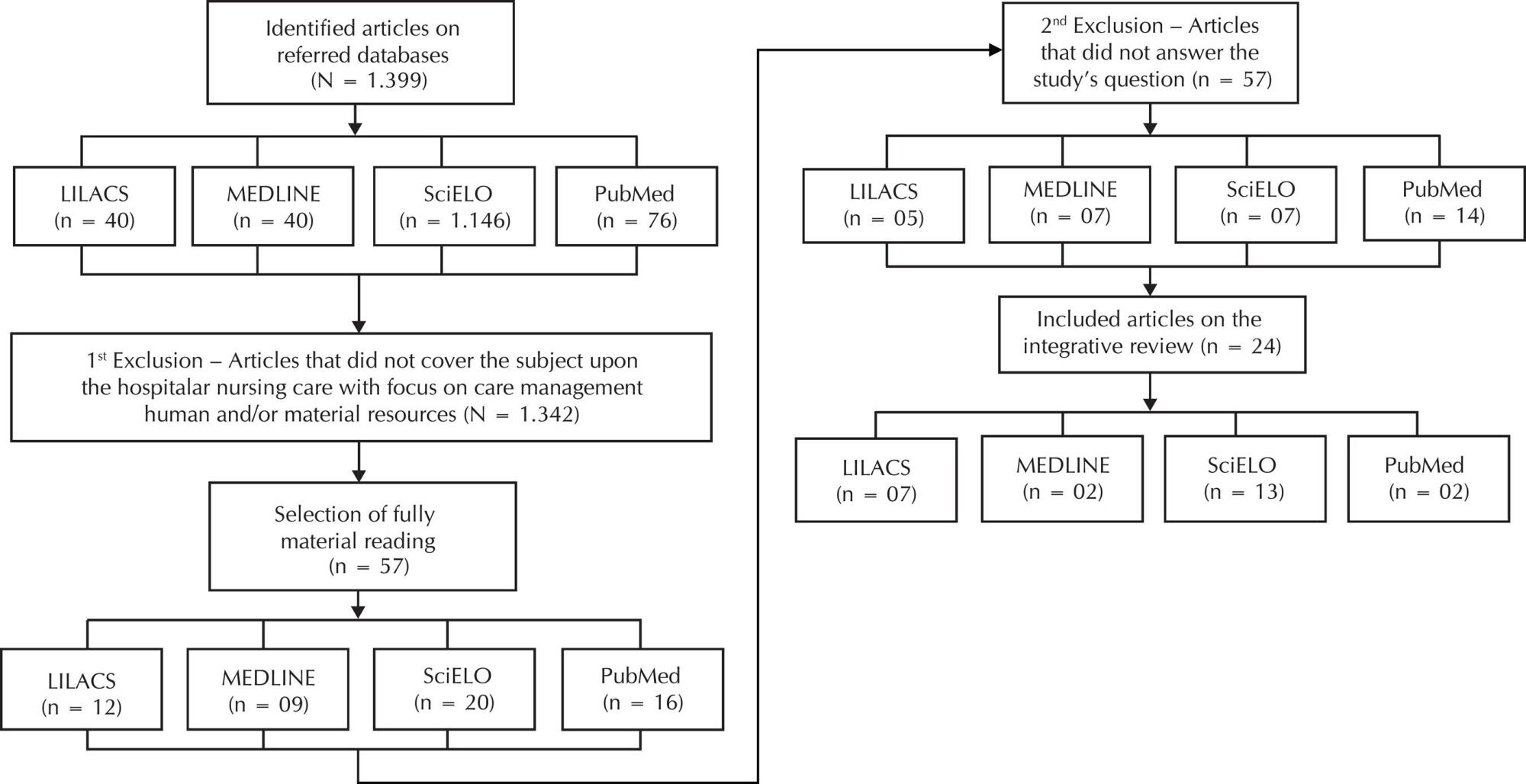
-
01-01-2015
Association between fatigue and functional capacity in patients with intermittent claudication
Revista Brasileira de Enfermagem. 2015;68(5):937-944
Abstract
Association between fatigue and functional capacity in patients with intermittent claudication
Revista Brasileira de Enfermagem. 2015;68(5):937-944
DOI 10.1590/0034-7167.2015680524i
Views0See moreABSTRACT
Objective:
to characterize fatigue and exertion fatigue in patients with intermittent claudication (IC), and to test their association with sociodemographic and clinical variables, walking capacity and level of physical activity.
Method:
forty-nine participants (66.6 years; 70% male) were studied. Validated questionnaires were used to assess fatigue (DUFS), exertion fatigue (DEFS), level of physical activity (BASIC) and walking capacity (WIQ).
Results:
participants had substantial fatigue (DUFS = 20.4+8.8) and substantial exertion fatigue (DEFS = 20.4+10.8). There was an association between the DUFS and marital status (p = 0,008). There was a statically significant association between DEFS with scores of the BASIC (r = .331; p = .02) and among DEFS with WIQ domains – walking distance (r=.359; p = .011) and climbing stairs (r=.331; p = .02).
Conclusion:
patients with IC have fatigue and exertion fatigue. Exertion fatigue might compromise the engagement of these patients in physical activity, one of the main components of IC treatment.
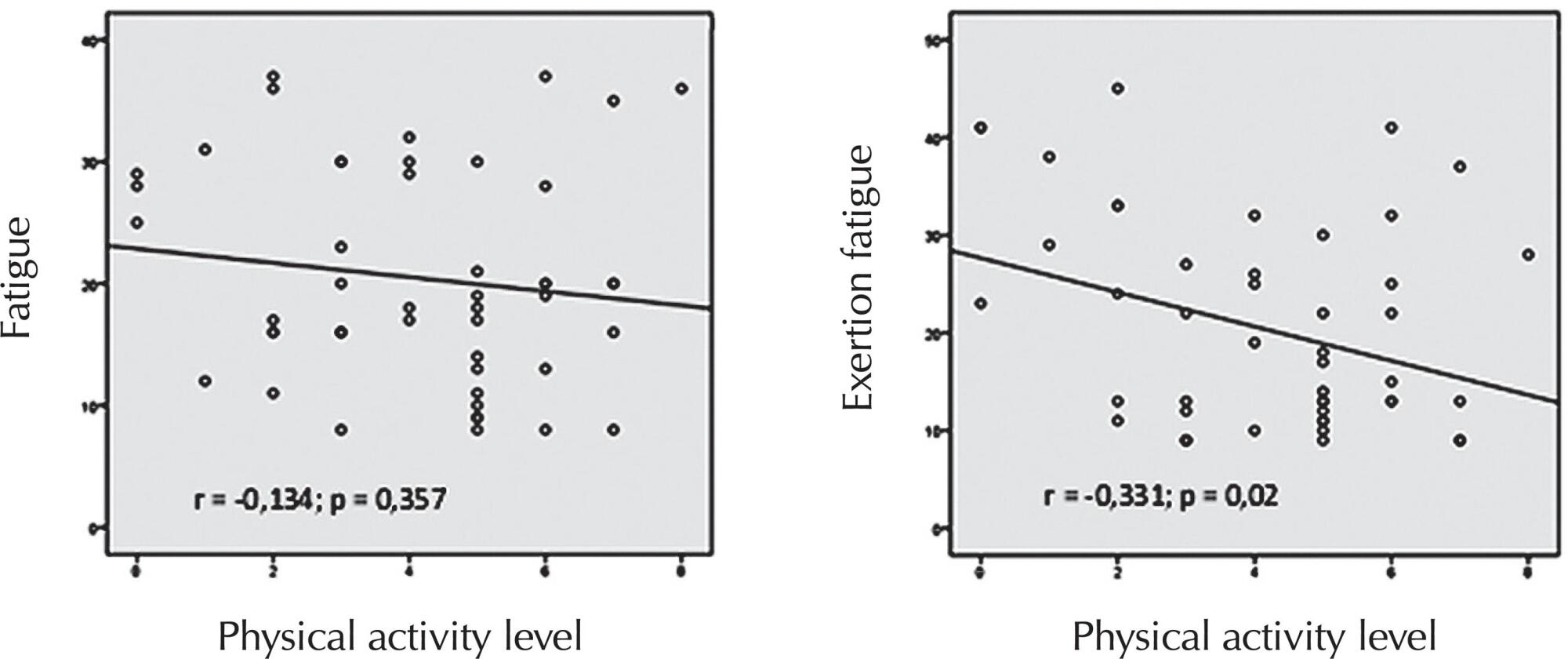
-
01-01-2015
Body mobilization for prevention of pressure ulcers: direct labor costs
Revista Brasileira de Enfermagem. 2015;68(5):930-936
Abstract
Body mobilization for prevention of pressure ulcers: direct labor costs
Revista Brasileira de Enfermagem. 2015;68(5):930-936
DOI 10.1590/0034-7167.2015680523i
Views0See moreABSTRACT
Objective:
to calculate the average total cost (ATC) on the direct labor costs (DLC) of nursing professionals in body mobilization of patients for the prevention of pressure ulcers.
Method:
this is a quantitative, exploratory and, descriptive research. We observed 656 preventive mobilizations and we calculated the cost by multiplying the time spent by professionals at a unitary DLC.
Results:
ATC with DLC for each Unit corresponded to: Medical Clinic R$ 5.38 for bed turning, R$ 5.26 for seating positions, R$ 5.55 for walking aid; Surgical Clinic R$ 2.42 for bed turning, R$ 2.30 for seating positions, R$ 2.96 for walking aid and Intensive Care Unit R$ 8.15 for bed turning, R$ 7.57 for seating positions, R$ 15.32 for walking aid.
Conclusion:
the knowledge generated can support management related to costs of human resources needed to efficiently and effectively nursing care.
-
01-01-2015
The mobilization of nurses for the non-interruption of nursing residence
Revista Brasileira de Enfermagem. 2015;68(5):923-929
Abstract
The mobilization of nurses for the non-interruption of nursing residence
Revista Brasileira de Enfermagem. 2015;68(5):923-929
DOI 10.1590/0034-7167.2015680522i
Views0See moreABSTRACT
Objective:
To analyze the strategies employed by nurses to maintain the nursing residence program at the Ophir Loyola Hospital and discuss the potential effects of this interruption on the state of Pará.
Method:
Social-historic research. Data were collected through primary sources, written documents, and oral testimonial; the secondary sources used were manuals and articles that approached the topic in question. The theoretical reference was based on the French sociologist Pierre Bourdieu’s ideas about the concepts of cultural, social, and symbolic capital, in addition to the habitus and field concepts.
Results:
During the nurses’ mobilization there was a strong political influence on the development of the crisis and the interruption of the nursing residence Program at the Ophir Loyola Hospital, with implications for the nurses’ qualifications and the health care delivered to the societyof Pará.
Conclusion:
The analysis showed the prevalence of partisan political interests at the expense of social interests, culminating in the interruption of the nursing residency.
-
RESEARCH01-01-2017
Nursing throughout war times: political propaganda and professional valorization (1942-1945)
Revista Brasileira de Enfermagem. 2017;70(2):407-414
Abstract
RESEARCHNursing throughout war times: political propaganda and professional valorization (1942-1945)
Revista Brasileira de Enfermagem. 2017;70(2):407-414
DOI 10.1590/0034-7167-2016-0440
Views0See moreABSTRACT
Objective:
to discuss the symbolic effects of the publication on written press of institutional rites related to the courses promoted by the Brazilian Federal District’s Schools of Nursing during the Second World War.
Method:
exploratory and documentary study, whose sources were treated by historical method.
Results:
one noticed, in the news reports analyzed, that the Brazilian Estado Novo has used nurses images to divulge within the society the woman’s acting altruistic model in service to the country, through the systematic diffusion by the press of her honorable acting during the war, what assured the amplification of the visibility and acknowledgment of the Nursing profession in that context.
Conclusion:
the diffusion by press of emergency nurses graduations magnified their apparition in public spaces, occasion on which the institutional rite was strategically used to transmit to the society the urgency of the new profession, in order to support the political causes in vigor in the country.
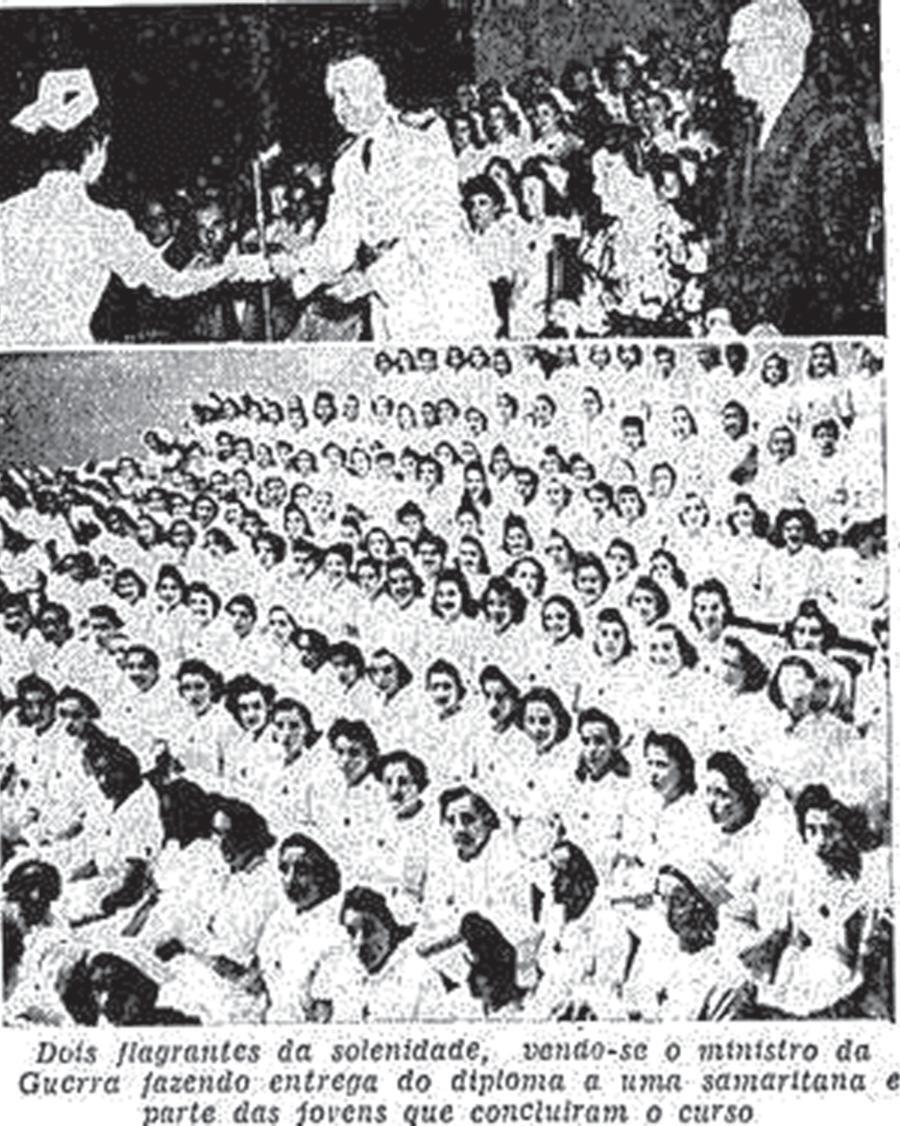
-
RESEARCH01-01-2017
Conformity of nurse prescribing to care needs: nurses’ understanding
Revista Brasileira de Enfermagem. 2017;70(2):400-406
Abstract
RESEARCHConformity of nurse prescribing to care needs: nurses’ understanding
Revista Brasileira de Enfermagem. 2017;70(2):400-406
DOI 10.1590/0034-7167-2016-0107
Views0See moreABSTRACT
Objective:
investigate the understanding of nurses on nurse prescribing conformity to the care needs of hospitalized patients and factors associated with that conformity.
Method:
a descriptive study, with a quantitative approach, was conducted at 20 in-patient units of a teaching hospital in the state of São Paulo. The participants (N=139) answered a semi-structured questionnaire.
Results:
For 43 (30.9%) nurses, nurse prescribing is always in line with patients’ care needs. The fields of body care and elimination, skin and mucosa care and investigation and monitoring were the most frequently addressed.
Conclusion:
in the perception of most nurses, nurse prescribing does not conform with patients’ health heeds. The establishment of strategies to improve prescribing quality is recommended, as well as the development of permanent qualification programs and the systematic use of instruments for assessment of patients’ care demands regarding nursing.
-
RESEARCH01-01-2017
Religious and spiritual coping in people living with HIV/Aids
Revista Brasileira de Enfermagem. 2017;70(2):392-399
Abstract
RESEARCHReligious and spiritual coping in people living with HIV/Aids
Revista Brasileira de Enfermagem. 2017;70(2):392-399
DOI 10.1590/0034-7167-2015-0170
Views0See moreABSTRACT
Objective:
evaluate the religiosity and the religious/spiritual coping of people living with HIV/Aids.
Method:
descriptive, cross-sectional study with quantitative approach, conducted in a reference HIV/Aids outpatient clinic in a university hospital of Recife-PE, Brazil, from June to November 2015. At total of 52 people living with HIV/Aids (PLWHA) participated in the research, which employed own questionnaire, the Duke University Religion Index (DUREL), and the Religious/Spiritual Coping Scale (RCOPE).
Results:
the sample presented high indices of organizational religiosity (4.23±1.66), non-organizational religiosity (4.63±1.50), and intrinsic religiosity (13.13±2.84). Positive RCOPE was used in high mean scores (3.66±0.88), and negative RCOPE had low use (2.12 ± 0.74). In total, use of RCOPE was high (3.77±0.74), having predominated the positive RCOPE (NegRCOPE/PosRCOPE ratio=0.65±0.46).
Conclusion:
it is evident the importance of encouraging religious activity and RCOPE strategies, seen in the past as inappropriate interventions in clinical practice.
-
RESEARCH01-01-2017
Satisfaction and dissatisfaction in the work of recyclable solid waste segregators: convergent-care research
Revista Brasileira de Enfermagem. 2017;70(2):384-391
Abstract
RESEARCHSatisfaction and dissatisfaction in the work of recyclable solid waste segregators: convergent-care research
Revista Brasileira de Enfermagem. 2017;70(2):384-391
DOI 10.1590/0034-7167-2016-0325
Views0See moreABSTRACT
Objectives:
describe elements that promote satisfaction and dissatisfaction in the work of recyclable solid waste segregators and conduct a nursing action focused on these elements.
Method:
qualitative research, convergent-care, conducted with members of the cooperative. Data production occurred during 2015 through participation observation, semi-structured interviews, and a convergence group. Analysis comprised the phases Apprehension, Synthesis, Theorization, and Transference.
Results:
four categories emerged. They showed satisfaction and dissatisfaction related to identification with tasks and work content, material and personal gains obtained from solid waste segregation, prejudice, lack of appreciation, and difficulties in interpersonal relationships. This last item, due to its importance, received a nursing action.
Conclusion:
the study contributed to the advancement of knowledge and the association of possibilities between the research performance and nursing care for workers.
-
RESEARCH01-01-2017
The game as strategy for approach to sexuality with adolescents: theoretical-methodological reflections
Revista Brasileira de Enfermagem. 2017;70(2):376-383
Abstract
RESEARCHThe game as strategy for approach to sexuality with adolescents: theoretical-methodological reflections
Revista Brasileira de Enfermagem. 2017;70(2):376-383
DOI 10.1590/0034-7167-2016-0043
Views0See moreABSTRACT
Objective:
To describe the Papo Reto [Straight Talk] game and reflect on its theoretical-methodological basis.
Method:
Analytical study on the process of elaboration of the Papo Reto online game, destined to adolescents aged 15-18 years, with access to the Game between 2014 and 2015.
Results:
the interactions of 60 adolescents from Belo Horizonte and São Paulo constituted examples of the potentialities of the Game to favor the approach to sexuality with adolescents through simulation of reality, invention and interaction. Based on those potentialities, four thinking categories were discussed: the game as pedagogic device; the game as simulation of realities; the game as device for inventive learning; and the game empowering the interaction.
Conclusion:
By permitting that the adolescents take risks on new ways, the Game allows them to become creative and active in the production of senses, in the creation of their discourses and in the ways of thinking, feeling and acting in the sexuality field.
-
RESEARCH01-01-2017
Tuberculosis among prison staff in Rio Grande do Sul
Revista Brasileira de Enfermagem. 2017;70(2):370-375
Abstract
RESEARCHTuberculosis among prison staff in Rio Grande do Sul
Revista Brasileira de Enfermagem. 2017;70(2):370-375
DOI 10.1590/0034-7167-2016-0012
Views0See moreABSTRACT
Objective:
to evaluate the risk of infection and illness caused by Mycobacterium tuberculosis among health care and security staff in prisons in two regions of Rio Grande do Sul (RS).
Method:
cross-sectional study involving prison staff. An interview and sputum smear microscopy and culture were performed. Latent infection was evaluated according to the result of the tuberculin test (TT), self-referred.
Results:
among staff who had a TT, 10 (83.3%) in the central region and 2 (16.7%) in the southern region were considered reactors. Length of employment among prison officers who reacted to TT was 15.3 years, and among health care workers, 4.1 years (p = 0.01). No cases of active tuberculosis (TB) were identified.
Conclusion:
prevalence of latent TB was 27.9%. Length of employment between different professional categories and their working regions was considered a risk factor for latent TB.
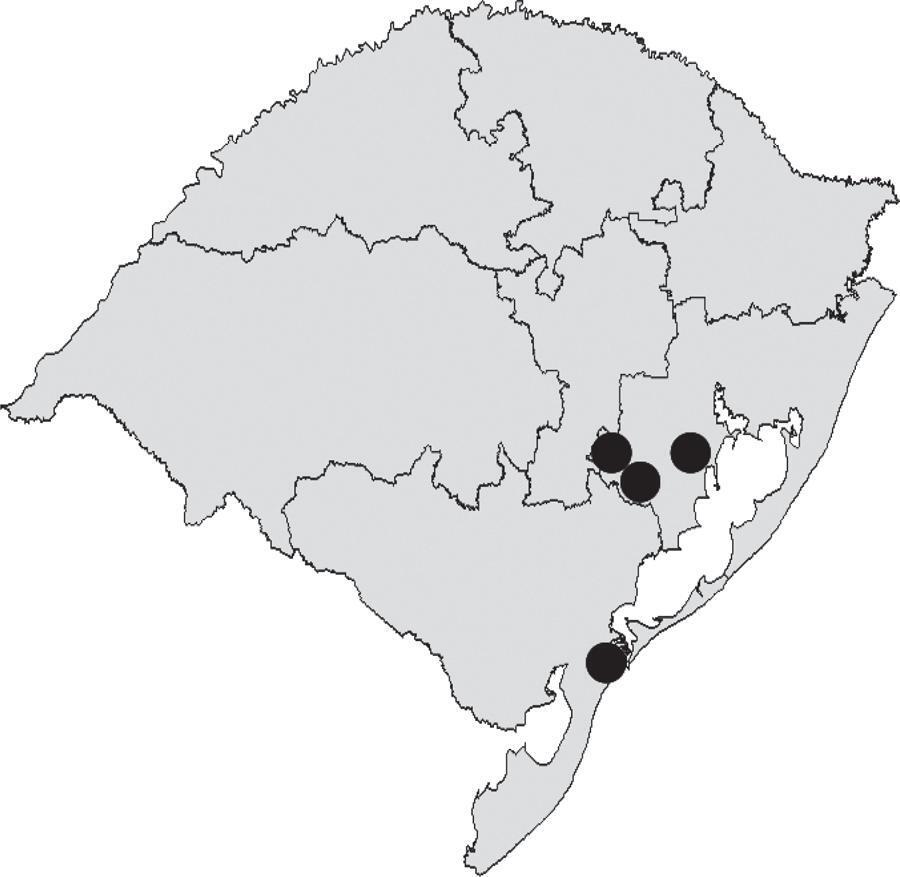
-
RESEARCH01-01-2017
Portable bathtub: technology for bed bath in bedridden patients
Revista Brasileira de Enfermagem. 2017;70(2):364-369
Abstract
RESEARCHPortable bathtub: technology for bed bath in bedridden patients
Revista Brasileira de Enfermagem. 2017;70(2):364-369
DOI 10.1590/0034-7167-2016-0178
Views0See moreABSTRACT
Objective:
determine the benefits of the Portable Bathtub as technology for bed bath in bedridden patients.
Method:
qualitative research of exploratory-descriptive character, whose data were collected by means of 30 interviews with patients, family members and professionals directly involved in bed bath, carried out with Portable Bathtub, in bedridden patients of a medical clinic, from July to December 2015.
Results:
from the data encoded by thematic content analysis resulted two categories: Portable Bathtub: from morphine to the patient’s rekindled eyes; From mechanized practice to unique, transforming care.
Conclusion:
we concluded that the Portable Bathtub constitutes enhancing technology, as it enables clinical improvement of the patient’s general condition and transcends traditional mechanized practices by the reach of advanced nursing care practices.
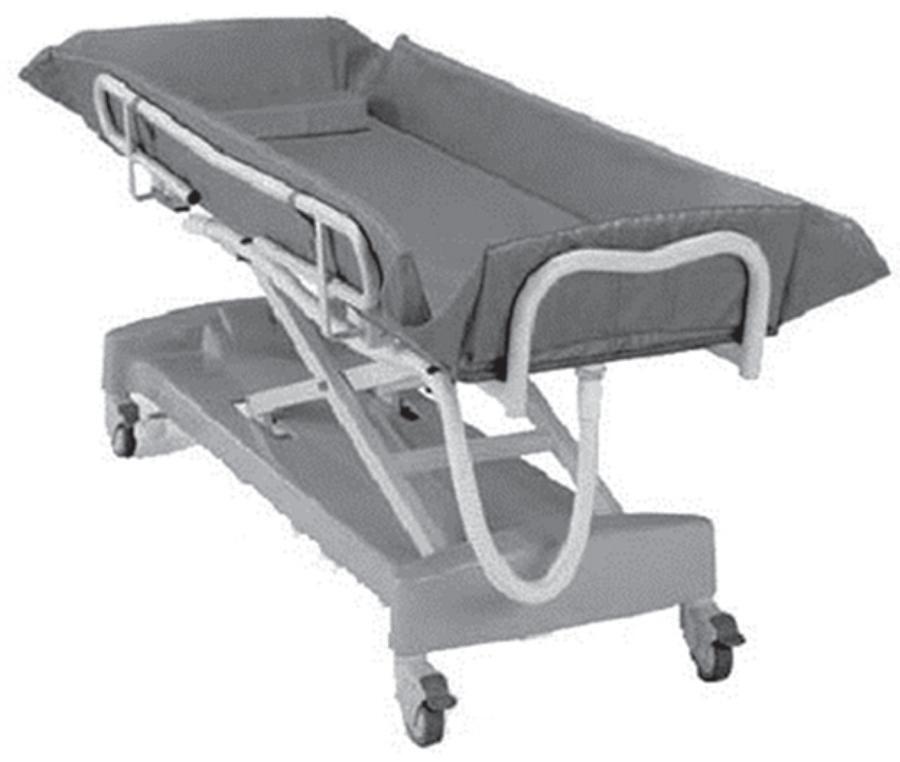
-
RESEARCH01-01-2017
Direct cost of monitoring conventional hemodialysis conducted by nursing professionals
Revista Brasileira de Enfermagem. 2017;70(2):357-363
Abstract
RESEARCHDirect cost of monitoring conventional hemodialysis conducted by nursing professionals
Revista Brasileira de Enfermagem. 2017;70(2):357-363
DOI 10.1590/0034-7167-2016-0447
Views0See moreABSTRACT
Objective:
to analyze the mean direct cost of conventional hemodialysis monitored by nursing professionals in three public teaching and research hospitals in the state of São Paulo, Brazil.
Method:
this was a quantitative, explorative and descriptive investigation, based on a multiple case study approach. The mean direct cost was calculated by multiplying (clocked) time spent per procedure by the unit cost of direct labor. Values were calculated in Brazilian real (BRL).
Results:
Hospital C presented the highest mean direct cost (BRL 184.52), 5.23 times greater than the value for Hospital A (BRL 35.29) and 3.91 times greater than Hospital B (BRL 47.22).
Conclusion:
the costing method used in this study can be reproduced at other dialysis centers to inform strategies aimed at efficient allocation of necessary human resources to successfully monitor conventional hemodialysis.
-
01-01-2015
Critical incidents in nursing academics: discovering a new identity
Revista Brasileira de Enfermagem. 2015;68(2):219-227
Abstract
Critical incidents in nursing academics: discovering a new identity
Revista Brasileira de Enfermagem. 2015;68(2):219-227
DOI 10.1590/0034-7167.2015680206i
Views0See moreABSTRACT
Objective:
a qualitative study that followed the principles of the grounded theory in order to analyze the professional identity of nursing academics through the analysis of the most disturbing critical incidents.
Method:
semi-structured interviews were conducted with seven nurses who worked as professors and researchers in a private university in Barcelona.
Results:
the resulting empirical material was organized into two categories: characterization of critical incidents and responsiveness to the incident.
Conclusion:
the professional identity of nurses regarding the academic area is still under construction and inexperience is the major obstacle in the management of critical incidents in the teaching career.
-
01-01-2015
Body mass index, waist circumference, and arterial hypertension in students
Revista Brasileira de Enfermagem. 2015;68(2):214-218
Abstract
Body mass index, waist circumference, and arterial hypertension in students
Revista Brasileira de Enfermagem. 2015;68(2):214-218
DOI 10.1590/0034-7167.2015680205i
Views0See moreABSTRACT
Objective:
to investigate what is the best anthropometric predictor of arterial hypertension among private school students.
Method:
this was a cross-sectional study with 286 students between the ages of 10 and 14 from two private schools in the city of Paranavaí, Paraná, Brazil. The following variables were analyzed: body mass index, waist circumference and blood pressure. Statistical analysis was conducted with Pearson’s partial correlation test and multivariate logistic regression, with p<0.05.
Results:
both anthropometric indicators displayed weak correlation with systolic and diastolic levels, with coeffi cients (r) ranging from 0.27 to 0.36 (p < 0.001). Multivariate analysis showed that the only anthropometric indicator associated with arterial hypertension was waist circumference (OR= 2.3; 95% CI: 1.1-4.5), regardless of age or gender.
Conclusion:
this age group, waist circumference appeared to be a better predictor for arterial hypertension than body mass index.
-
01-01-2015
Perception of primary healthcare management nurses on the nursing process
Revista Brasileira de Enfermagem. 2015;68(2):206-213
Abstract
Perception of primary healthcare management nurses on the nursing process
Revista Brasileira de Enfermagem. 2015;68(2):206-213
DOI 10.1590/0034-7167.2015680204i
Views0See moreABSTRACT
Objective:
this qualitative study aimed to analyze the perceptions of primary health care management nurses on the nursing process.
Method:
data were collected through interviews and analyzed by the Content Analysis proposed by Bardin’s theoretical framework.
Results:
managers recognize the importance of the nursing process, although its implementation was not a priority at the time of the interviews. A conceptual diffi culty and a lack of understanding that the implementation of the care methodology should be a cross-departmental action in the local healthcare management were clearly observed.
Conclusion:
managers should have their perspectives broadened concerning the relevance of the nursing process and the professional training. The active participation of legislative nursing bodies, local healthcare management and the federal government may open the way for the effective implementation of the nursing process.
-
01-01-2015
Cross-cultural cultural adaptation of the “Nursing Students’ Attitudes Toward Mental Health Nursing and Consumers” in Brazil
Revista Brasileira de Enfermagem. 2015;68(2):198-205
Abstract
Cross-cultural cultural adaptation of the “Nursing Students’ Attitudes Toward Mental Health Nursing and Consumers” in Brazil
Revista Brasileira de Enfermagem. 2015;68(2):198-205
DOI 10.1590/0034-7167.2015680203i
Views0See moreABSTRACT
Objective:
to make across-cultural adaptation of the “Nursing Students’ Attitudes Toward Mental Health Nursing and Consumers” scale in Brazil.
Method:
the scale was tested regarding conceptual, item, semantic, and operational equivalence.
Results:
content validation was conducted by an expert committee with a minimum consensus level of 80%. This process resulted in a 35-item scale divided into 6 factors. The experts reached 100% consensus on the scale’s clarity of language, practical pertinence and theoretical relevance, as well as on the need for excluding one factor. Data were collected in 2013 in the city of Londrina, Paraná, Brazil.
Conclusion:
the instrument was cross-culturally adapted to Brazilian Portuguese and presented satisfactory content validity. We propose further studies on the scale’s psychometric properties, such as construct validity, internal consistency and reliability.
-
01-01-2015
Relational skills and preserving patient privacy in the caring process
Revista Brasileira de Enfermagem. 2015;68(2):191-197
Abstract
Relational skills and preserving patient privacy in the caring process
Revista Brasileira de Enfermagem. 2015;68(2):191-197
DOI 10.1590/0034-7167.2015680202i
Views0See moreABSTRACT
Objective:
to analyze the development and mobilization of relational skills central to the caring process among nursing students throughout their professional training.
Method:
this was a quantitative study, descriptive and cross-sectional in design. The sample consisted of nursing undergraduate students from the Higher School of Health Sciences, in the city of Évora, Portugal. Data were collected using the previously validated Helping Relational Skills Inventory.
Results:
the students gradually acquired “generic skills”, “communication skills” and “contact skills”, presenting the highest mean score in the last year of the program. However, the highest mean score for the “empathetic skills” subscale was presented by second-year students.
Conclusion:
age and year in program were found to be decisive variables regarding the acquisition of specifi c skills (empathetic and communication) by nursing students.
-
01-01-2015
The Brazilian Association of Nursing in the uncompromising defense of the Brazilian Unified Health System
Revista Brasileira de Enfermagem. 2015;68(2):185-186
Abstract
The Brazilian Association of Nursing in the uncompromising defense of the Brazilian Unified Health System
Revista Brasileira de Enfermagem. 2015;68(2):185-186
DOI 10.1590/0034-7167.2015680201i
Views0The title of the 2015 Editor’s Comments could very well be from a journal published in decades past, a time when, in Brazil, all professional entities and civil society fought for the right to health, as was later established in the Brazilian Constitution of 1988. Twenty-five years later, despite its financial limitations and restricted operational […]See more -
01-01-2015
A ABEn na defesa intransigente do SUS
Revista Brasileira de Enfermagem. 2015;68(2):185-186
Abstract
A ABEn na defesa intransigente do SUS
Revista Brasileira de Enfermagem. 2015;68(2):185-186
DOI 10.1590/0034-7167.2015680201i
Views0Este título do Editorial de 2015 bem poderia ser de uma revista publicada em décadas passadas, período em que todas as entidades profissionais e a sociedade civil lutaram pela saúde como direito, como conquistado na Constituição de 1988. Vinte e cinco anos depois, com o Sistema Único de Saúde capilarizado por todo o país, mesmo […]See more -
EXPERIENCE REPORT01-01-2015
Nursing diagnoses and interventions for a child after cardiac surgery in an intensive care unit
Revista Brasileira de Enfermagem. 2015;68(1):155-160
Abstract
EXPERIENCE REPORTNursing diagnoses and interventions for a child after cardiac surgery in an intensive care unit
Revista Brasileira de Enfermagem. 2015;68(1):155-160
DOI 10.1590/0034-7167.2015680121i
Views0See moreObjetivo:
descrever o julgamento clínico de enfermagem para identificar diagnósticos NANDA e desenvolver um plano de tratamento NIC para uma criança em pós-operatório de cirurgia cardíaca em terapia intensiva.
Método:
estudo de caso com coleta de dados retrospectiva no prontuário.
Resultados:
três enfermeiras identificaram diagnósticos NANDA e intervenções NIC. Criança de 6 meses, submetida a cirurgia cardíaca, necessitou oxigenação extracorpórea por membrana no pós-operatório. Foram identificados quatro principais diagnósticos, aos quais foram direcionadas dez intervenções. A proposta de intervenções para responder às necessidades humanas prioritárias da criança foi otimizada pelo uso das terminologias padronizadas. Todos os diagnósticos foram sustentados por indicadores diagnósticos; todas as intervenções foram cientificamente sustentadas.
Conclusão:
espera-se que os enfermeiros abordem não somente as respostas fisiológicas, mas também aquelas dos domínios psicossociais.
Search
Search in:
Nuvem de Tags
Adolescente (85) Atenção Primária à Saúde (239) COVID-19 (91) Criança (91) Cuidados de Enfermagem (269) Educação em Enfermagem (151) Educação em Saúde (139) Enfermagem (930) Enfermagem Pediátrica (86) Estudantes de Enfermagem (77) Estudos de Validação (131) Família (87) Idoso (208) Promoção da Saúde (99) Qualidade de Vida (104) Saúde do Trabalhador (86) Saúde Mental (145) Saúde Pública (82) Segurança do Paciente (150) Tecnologia Educacional (100)



